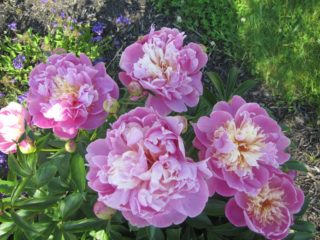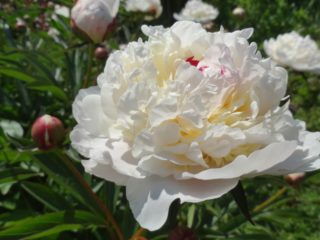Content
- 1 What does it mean "peony ITO-hybrid"
- 2 How you can propagate ITO-peonies
- 3 The best varieties of ITO-peonies
- 3.1 Hillary
- 3.2 Pastel Splendor
- 3.3 Viking Full Moon
- 3.4 Lois Choice
- 3.5 Julia Rose
- 3.6 Dark Eyes
- 3.7 Copper Kettle
- 3.8 Pink Hawian Coral
- 3.9 Yellow Emperor
- 3.10 Lollipop
- 3.11 Canary Diamonds
- 3.12 Lafayette Squadron
- 3.13 First Errival
- 3.14 Yellow Crown
- 3.15 Impossible Dream
- 3.16 Magic Mystery Tour
- 3.17 Cora Louise
- 3.18 Norvijien Blush
- 3.19 Prairie Charm
- 4 Application in landscape design
- 5 Planting and caring for peonies ITO-hybrids
- 6 Caring for ITO-hybrids of peonies
- 7 Pests and diseases
- 8 Conclusion
- 9 Testimonials
ITO peonies have appeared recently. But despite this, they have already become popular all over the world. Today these are serious competitors to herbaceous and tree-like varieties. And it is not surprising, because they have many advantages, among which are the main ones: high phytoimmunity, unpretentious care, large size of flowers.
What does it mean "peony ITO-hybrid"
ITO peonies (Paeonia ITOH) are herbaceous ornamental plants that were obtained by crossing treelike and herbaceous varieties.
They got their name in honor of the Japanese who bred them in 1948 - Toichi Ito. The hybrid has incorporated the best qualities of the parent varieties. Today scientists continue to improve it.
Description of peonies ITO-hybrids
ITO hybrids are powerful large bushes with strong shoots. They have spreading roots located close to the surface of the earth. Over time, they greatly grow and grow stiff. This makes the transplant difficult. The height of the bush reaches 8.5 dm. The shoots can bend under the weight of the flowers, but they do not lie on the ground. The leaves are densely arranged. They are similar to those of tree varieties - also carved. The green mass in AID hybrids can persist until the onset of frost. By autumn, their shade changes only in certain varieties. Just like in herbaceous peonies, in ITO hybrids, the shoots die off annually. This happens in the fall. In the spring they grow out of the ground again.
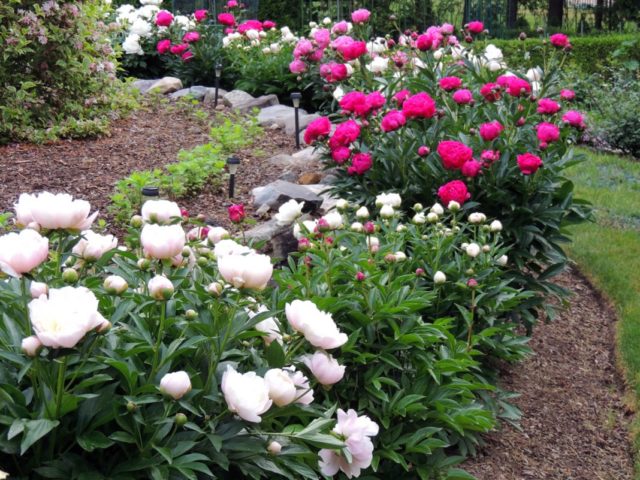
ITO peonies are a cross between herbaceous and tree-like type.
How ITO peonies bloom
The buds of ITO hybrids are at the very tops of the shoots. Depending on the variety and its care, the diameter of the flowers can reach 18 cm. The petals that are part of them are characterized by waviness. They usually have spots at the base. The palette in this case is wide. There may be transitions from one shade to another. Almost all ITO peonies are prone to burnout. As the buds bloom, the petals brighten.
The flowering time of ITO peony hybrids depends on the variety. Early species can bloom as early as April. The buds of late varieties bloom after other types of peonies have bloomed. The duration of budding is also different. The best hybrids of ITO peonies bloom for about a month.
How you can propagate ITO-peonies
Reproduction of AID hybrids is possible only by dividing the bush. Even if the grower manages to get the seeds, then it is pointless to use them. The plants that grow from them will have different qualities and will lose their species characteristics. You can divide the bush after five years of life. If you do this earlier, the plant will die. After the first separation, the procedure is repeated every 3 years.
To divide the bush, it is removed from the soil, the roots are shaken off the ground. From one specimen, no more than 2-3 fragments with 3-5 buds and a similar number of roots are obtained. The rhizome is divided with a sharp garden knife. If there are rotten areas on the roots, they are excised. After the procedure of delenki of hybrids, ITO is treated with a growth stimulator and immediately planted.
The best varieties of ITO-peonies
At the moment, there are different subspecies of AID. It is impossible to say unequivocally which one is better and which one is worse. Each has its own pros and cons. After studying the description of the peonies of the ITO varieties, and looking at their photos with the names, everyone can choose the option that suits them.
Hillary
Hillary is an ITO peony with a maximum height of 60 cm. The flowers are semi-double. Their size is 20 cm, fuchsia petals acquire beige shades over time. The color range is changeable. It happens that one bush blooms with different buds: from beige-white to amber-amaranth. Inflorescences begin to bloom in late spring.
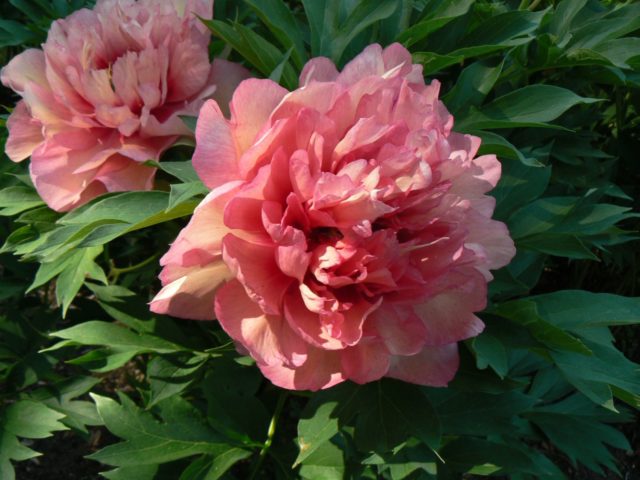
Hillary Peony Bouquet is the best gift for any occasion
Pastel Splendor
Pastel Splendour is a medium-sized plant. The height of the bush is 80 cm. The flowers are semi-double, with a diameter of 17 cm. The color of the petals combines shades of beige, lilac, lemon and pink. The petals have a purple-scarlet spot at the base.
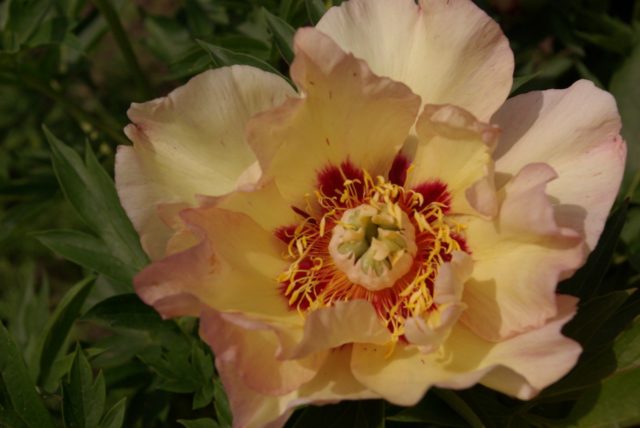
Pastel Splendor looks very delicate thanks to the special shade combination
Viking Full Moon
Viking Full Moon is a plant up to 80 cm tall. Its flowers are semi-double, reaching 18 cm in diameter. The petals are yellow, but there are subtle nuances of light green. At the base of the petals there is a red-orange spot.
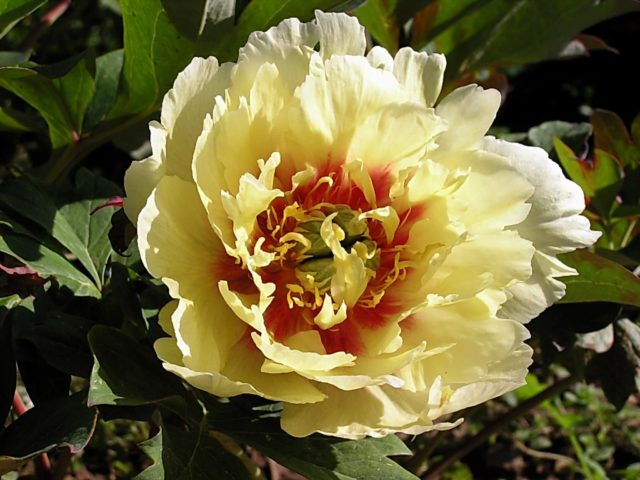
Viking Full Moon growing in a flower bed cannot but rejoice
Lois Choice
Lois Choice is an ITO peony bred in the USA in 1993. Terry flowers, complex color. The buds open early. The base of the petals is beige and white. This shade towards the top turns into beige yellow and peach pink. The shoots of the variety are strong, the leaf plates are rich green.
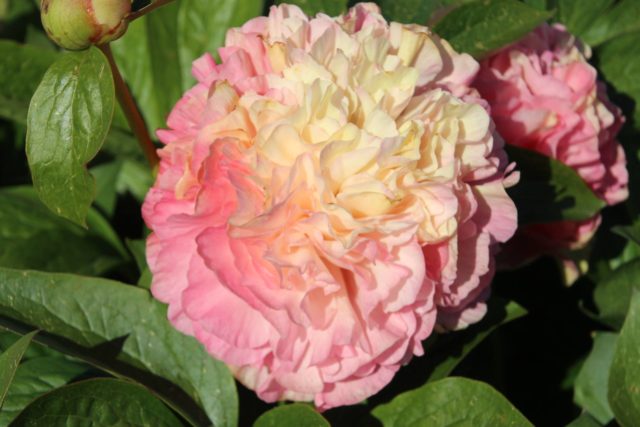
Peony Ito Lois Choice reaches 75 cm in height
Julia Rose
Julia Rose is an ITO variety that fade to yellow. At the same time, the base of the petals always remains more saturated. Pink, unevenly colored buds throughout the plant, during blooming, change color to pale yellow.
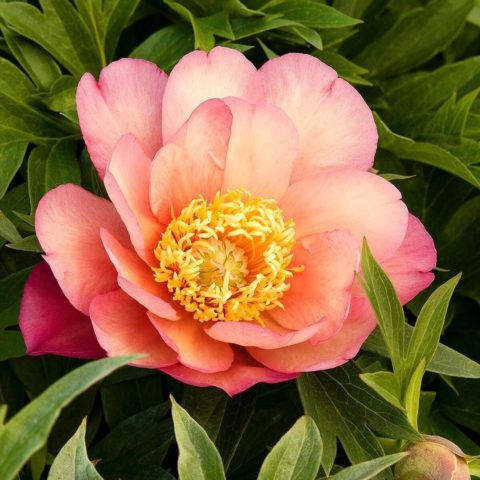
Peony Julia Rose can be called a real miracle of a flower garden
Dark Eyes
Dark Eyes is an ITO variety that is prized for its unusual maroon petals. The height of the plant is 90 cm. The diameter of the flowers is not too large - 15 cm. This minus is compensated by the fact that the peony produces a lot of buds.
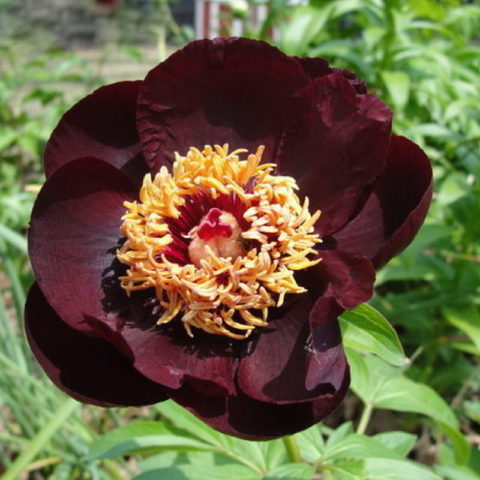
The Dark Eyes peony was bred back in 1996 but still hasn't spread widely.
Copper Kettle
Copper Kettle means "Copper kettle". This is another rare and not quite common variety of ITO peonies. It is appreciated by flower growers due to its unpretentiousness. Tricolor semi-double flowers of this variety are real giants. Their diameter is 20 cm. Shades of scarlet, yellow and orange combined and gave the flower a unique "copper" look. The bush of this ITO hybrid grows slowly. Its maximum height is 90 cm.
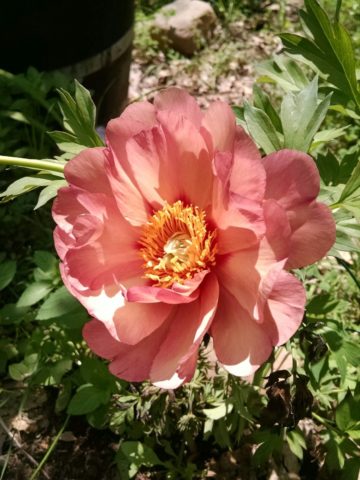
Copper Kettle was launched in the USA in 1999
Pink Hawian Coral
Pink Hawaiian Coral is a 85 cm high shrub. It produces semi-double flowers with a diameter of 16 cm. Flowering lasts from May to June. When the buds are fully open, the coral petals take on an apricot hue. In the center there are beige-yellow stamens.
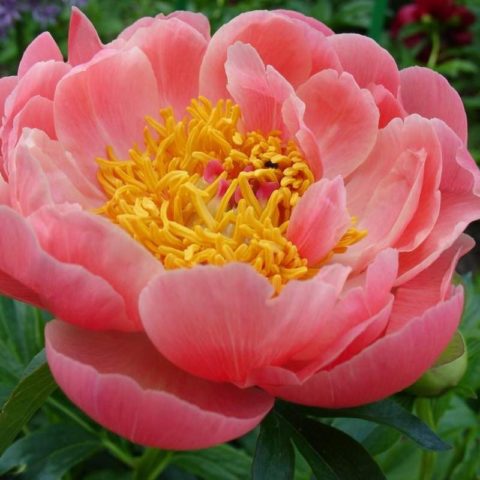
Pink Hawaiian Coral hybrid needs bright lighting
Yellow Emperor
Yellow Emperor is one of the proven ITO varieties. Its semi-double flowers reach 13 cm in diameter. Petals are yellow. There is a rich scarlet spot at their base. The buds of this variety are hidden behind a lush green mass. The flowering is rich.
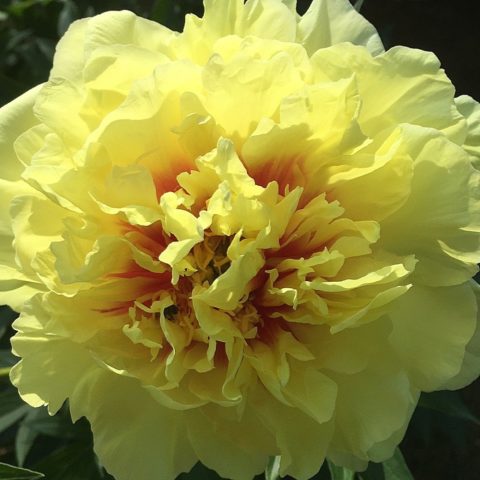
Peony ITO Yellow Emperor was one of the first
Lollipop
Lollipop is a hybrid up to 90 cm high. Semi-double buds.Their diameter is 18 cm. The color of the petals is light yellow. There are many purple blotches on them. As it blooms, the shade of the petals changes from yellow to lemon, peach and soft coral.
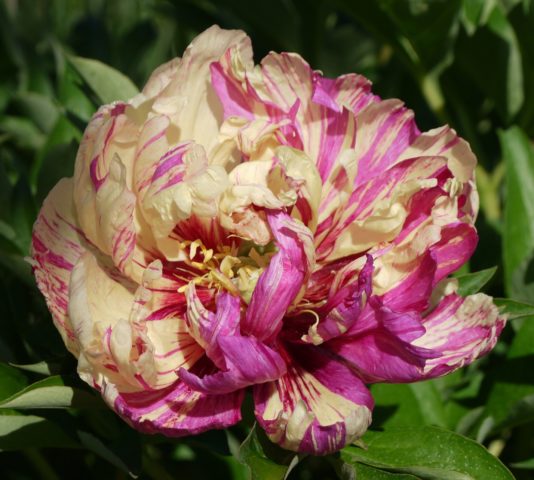
Peony Lollipop looks very unusual
Canary Diamonds
Canary Brilliants is a hybrid with a maximum height of 70 cm. Its flowers are densely doubled. The color of the petals is formed from many shades of yellow. They have an orange-colored spot at their base. The buds begin to open in the middle of spring or closer to its end.
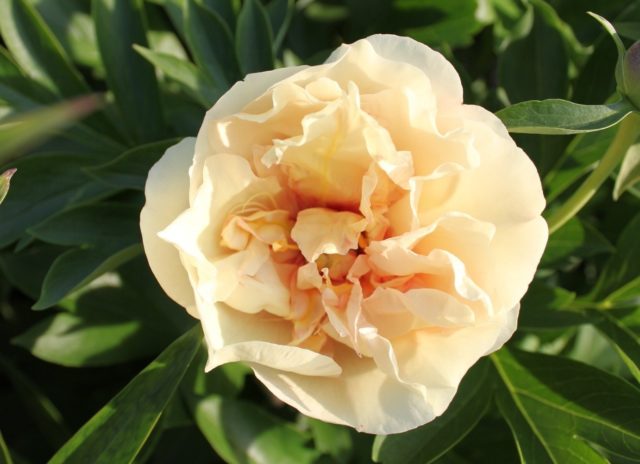
Canary Brilliants is a densely doubled representative of ITO peonies
Lafayette Squadron
Lafayette Escadrille was launched in 1989. The hybrid has simple flowers, which include up to 10 narrow petals. Their diameter is 10 cm. The color is bright - black and burgundy. The height of the ITO peony is 75 cm.
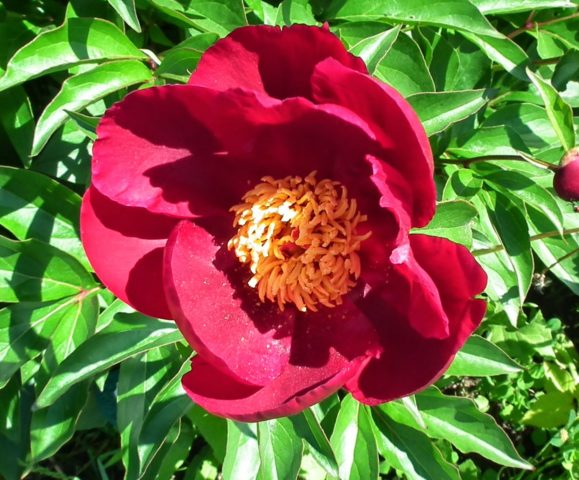
Breeders from the USA worked on the creation of Lafayette Escadrille
First Errival
First Arrival was launched in 1986. Semi-double graceful flowers of this variety are initially painted in lavender-pink color. However, over time, the edges of their petals become light pink. The diameter of the flowers is 20 cm.The height of the bush itself reaches 75-90 cm.
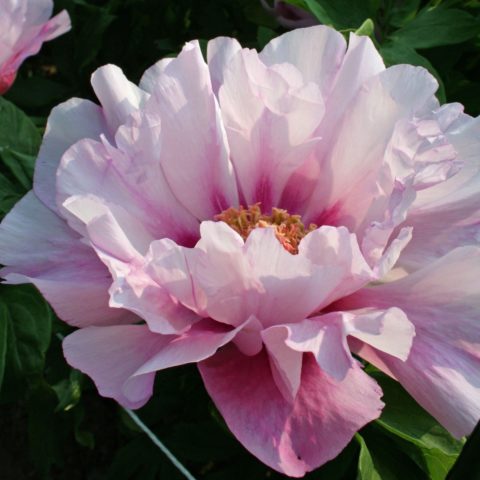
Homeland of First Arrival - Holland
Yellow Crown
Yellow Crown can be called a stunted hybrid of ITO. Its height does not exceed 60 cm. Flowers are double, not large, but not small either. The petals are sunny yellow. They have deep scarlet strokes at their base. The number of simultaneously opened buds on one bush can be up to 30.
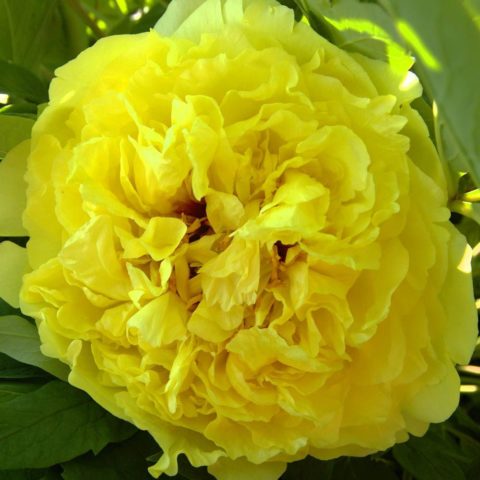
The Yellow Crown is characterized by abundant flowering
Impossible Dream
Impossible Dream is one of the least known peonies of the ITO group. Its semi-double lilac-pink flowers are one of the largest and reach 25 cm in diameter. The petals are rounded, arranged in 4-6 rows. The size of the bush is 90 cm. It begins to bloom early.
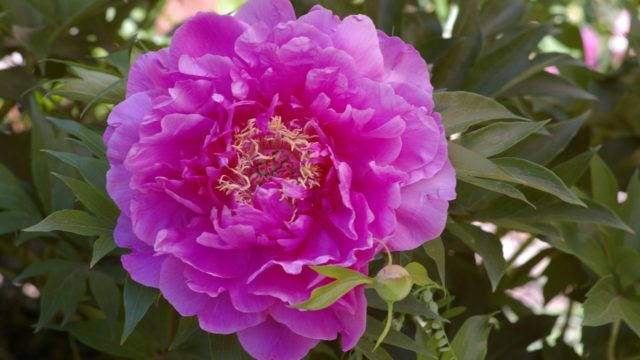
The Impossible Dream was launched in 2004
Magic Mystery Tour
Magical Mystery Tour is a tall ITO peony. The variety was bred in the United States in 2002. The diameter of the flowers varies within 16 cm. The color of the petals is creamy peach. Brown spots are present at their base. As it blooms, the petals first become light beige, and a little later - pale pink. An adult shrub can produce up to 50 buds per season.
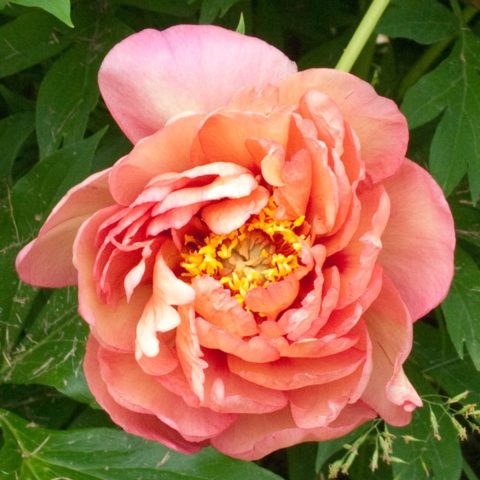
The height of the Magical Mystery Tour peony is 90 cm
Cora Louise
Cora Louise is a mid-season ITO peony. Outwardly, it resembles a mountain peony to many. Its flowers are semi-double, up to 25 cm in diameter. The color of the petals includes white, pale pink, beige and lilac shades. At the base of the petals there is a deep purple spot. A bunch of yellow stamens is located in the center of the bud. Reviews about this peony ITO are positive.
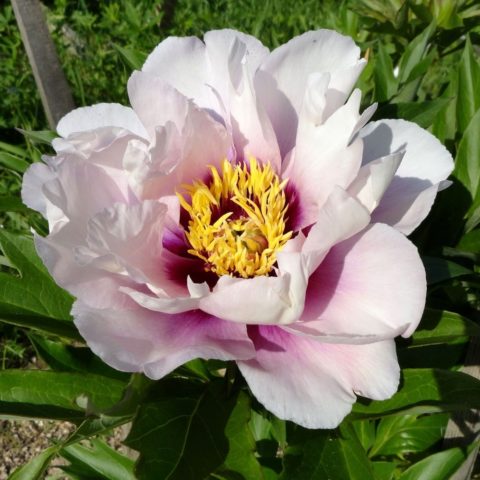
Cora Louise flowers are gigantic
Norvijien Blush
Norwegian Blush is a hybrid of ITO with semi-double flowers with a diameter of 17 cm. Its petals are pink-white. There is a dark spot at the base. There are yellow stamens in the center. The height of the ITO peony is 85 cm. It is important to plant this plant on well-drained soil. Otherwise, its roots will rot.
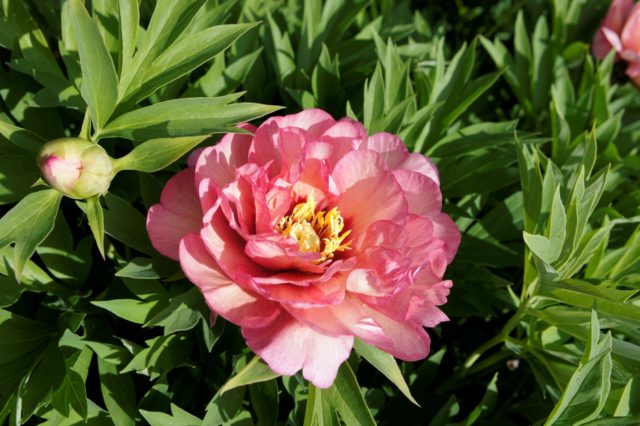
Norwegian Blush medium flowering time
Prairie Charm
Prairie Charm is another semi-double ITO peony. It was launched in 1992 in the United States. The diameter of its flowers is 16 cm. The color of the petals is yellow, with a greenish tint. They have purple spots at the bottom. The height of the peony is 85 cm.
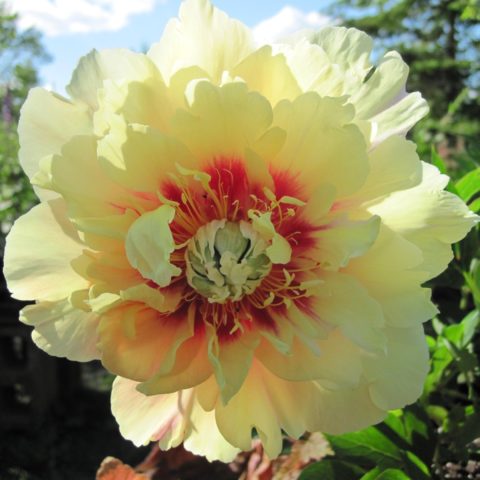
Prairie Charm bloom is medium late
Application in landscape design
Peonies look perfect in large areas surrounded by green lawn grass. However, not everyone has a large garden area. In this case, experts advise planting an existing flower bed (of any size) with peonies and roses. So that it is not half empty, in the spring you can add your favorite bulbous flowers to the plantings. A good option would be to use tulips. After the flowering of ITO peonies is completed, lilies, petunias, asters, chrysanthemums and phloxes will look great against the background of their leaves.
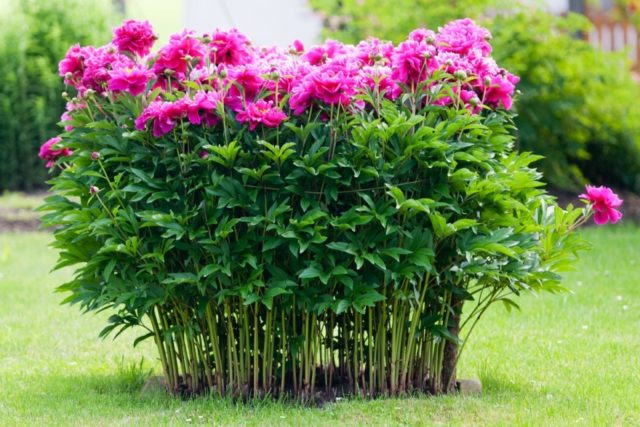
ITO peonies on the lawn look great
When creating a flower garden, it must be borne in mind that ITO peonies always dominate. They need to allocate the best place in the flower bed and surround them with companion plants. The flowering of peonies, although abundant, is short-lived.Before and after it starts, other ornamental plants will fill the space in the flower garden and please the eye.

Those who have a small plot should plant ITO peonies on flower beds in tandem with other flowers
ITO peonies are categorically incompatible with plants from the Buttercup family. The latter very quickly deplete the soil and secrete substances that inhibit other flowers.
Planting and caring for peonies ITO-hybrids
Immediately after planting, the AID peony may look lethargic. There is no need to worry about this, this is normal. Hybrids always take a long time to adapt and recover. In the first year, they do not bloom. Usually this process begins in 2-3 years. Although there are varieties that continue to bloom even after transplanting. This is the exception rather than the rule.
Planting dates for pions of ITO-hybrids
The most suitable time for planting AID peonies is the last week of August and the whole of September. In the southern regions, this period can be extended until the end of the second autumn month. After planting AID hybrid peonies in the fall, they manage to take root before the onset of severe cold weather.
Where and how to plant ITO hybrid peony
Having chosen the best varieties of ITO hybrids, you can start planting. The most suitable place is an area with loose soil, which contains a lot of humus. It is desirable that the ground be neutral or slightly alkaline. Peonies should not be planted in close proximity to trees and shrubs. In this case, the plants will have to fight for light and nutrients. Peonies should not be placed near buildings where, during precipitation, a runoff can form from the roof on them. Lowlands, where melt and rainwater are collected, are also not suitable for them.
Peonies love light, tolerate partial shade well. The ideal option is to place the AID hybrid in a place where it will be under the sun in the morning and late in the evening, and will be protected from the scorching rays at lunchtime. Then the peony will bloom for a long time, and its flowers will not fade.
A place for planting AID varieties must be prepared in a month. In this case, the fertilizers will have time to dissolve, and the soil will settle. A hole 50 cm in size is dug under each bush3... Drainage is placed at the bottom (for example, expanded clay). This is especially important if the peony is planned to be planted in an area where groundwater is close to the surface.
To the recommended volume of the pit add 3 buckets of land, 1 glass of phosphorus fertilizer, ½ bucket of ash, 6 glasses of bone meal and ½ glass of any preparation containing a complex of minerals. The soil intended to fill the pit, as well as the prepared substrate, are sieved. Thanks to this, the soil is saturated with oxygen and remains loose for a long time.
How to plant ITO-hybrids of peonies
The seedling is placed in the center of the pit and covered with earth. The root buds should eventually be five centimeters from the surface. Plantings are watered abundantly. Then a bucket of soil is poured over each peony and slightly tamped. With the onset of spring, the land is harvested.
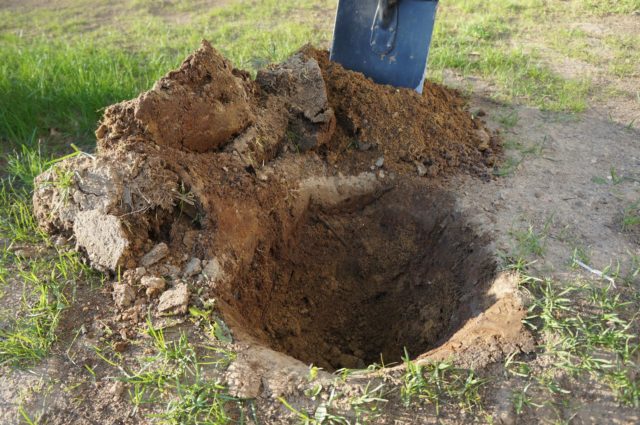
ITO peonies are planted in autumn
Caring for ITO-hybrids of peonies
Contrary to popular belief, ITO peonies are not the most capricious flowers. Caring for hybrids is no different from caring for any other peonies. It does not take much time and does not require any special skills. Even for a beginner, if he approaches this task responsibly, everything will work out.
Watering and feeding schedule
In the case of watering, they are guided by the condition of the soil. If its top layer begins to dry out, then the peony needs watering. It is important not to allow stagnation of water, otherwise the AID hybrid will start to hurt. To moisten the soil, use settled water at room temperature. It is poured directly under the root, being careful not to wet the green mass. The procedure is performed in the evening.
Every spring, bone meal and ash are added under the peonies. If the ITO hybrid has been growing in one place for more than three years, then any complex fertilizers are added to this. If peonies were not mulched with ground or manure, then in early May they are fed with Kemira. It is better to refuse the introduction of preparations containing nitrogen. Their use can lead to the development of fungal diseases. The second (last) feeding is carried out in the middle of the last summer month. In this case, an ash extract or a superphosphate solution is used.
Weeding, loosening, mulching
In order for peonies to grow strong and healthy, growers regularly carry out weed removal. The latter take useful components and moisture from flowers. In addition, pests can breed in them.
Loosening is performed after each watering. Do this carefully so as not to damage the AID hybrid. This procedure is necessary to ensure that sufficient oxygen is supplied to the roots. How abundant flowering will be depends on this.
To prevent overheating of the roots and rapid evaporation of moisture, ITO peonies are mulched. Dry grass is used as mulch. This procedure also helps to control the growth of weeds.
Pruning rules
After the peony has faded, it is pruned. To do this, use sharp garden shears. They remove the very top of the peduncles, where the seed box is formed, in front of the second real leaf. The cut site is treated with ash. Some growers also advise to remove the first buds so that they do not take away strength from a young, not strong peony.
Preparing for the winter ITO-peonies
The care of ITO peonies in autumn is special. At the end of September, they begin to prepare for the winter. Unlike herbaceous peonies, they do not get rid of the green mass for a long time, so it is cut off at the soil level. Then the planting is mulched with horse manure, and the top is covered with cut tops. Preparation of AID hybrid peonies for winter is required if the bushes are still young. Adult plants are highly frost-resistant and do not need shelter.
Pests and diseases
Most often, ITO varieties suffer from gray rot. It occurs due to the abuse of nitrogen-containing drugs, thickening of plantings, frequent and cold rains. Symptoms appear in the second half of May. Young stems begin to rot and fall off. The pathological process can affect leaves and flowers. In this case, they will be covered with gray mold. To solve this problem, you must first remove all diseased parts and burn them. This will prevent the spread of fiction. After that, the bushes should be shed with 0.6% Tiram suspension.
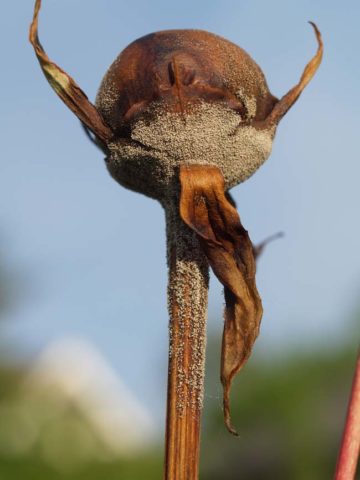
Gray rot is one of the most common diseases
In addition, powdery mildew can affect ITO peonies. This is mycosis, in which the green mass is covered with a white flour coating. Over time, it turns yellow and dies. In this case, it is useful to irrigate the bushes and the ground with a 0.2% Figon solution.
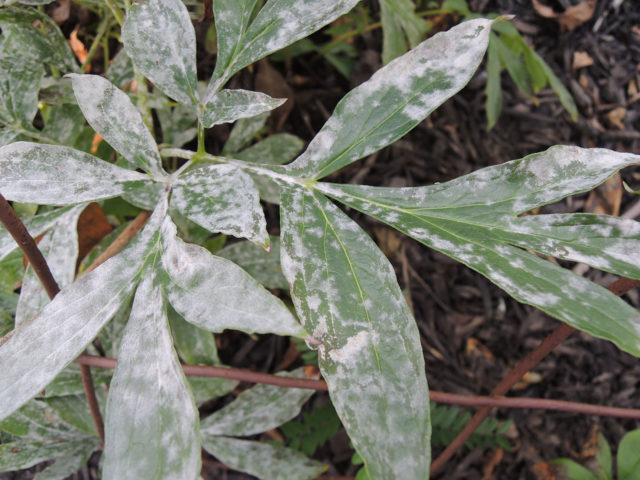
If you start to fight powdery mildew in a timely manner, the plant will recover.
Among the pests that pose a threat, aphids can be distinguished. She lives in the green mass of the plant and drinks its juice. To combat insects, insecticides are used (Ankara, Kinmiks).
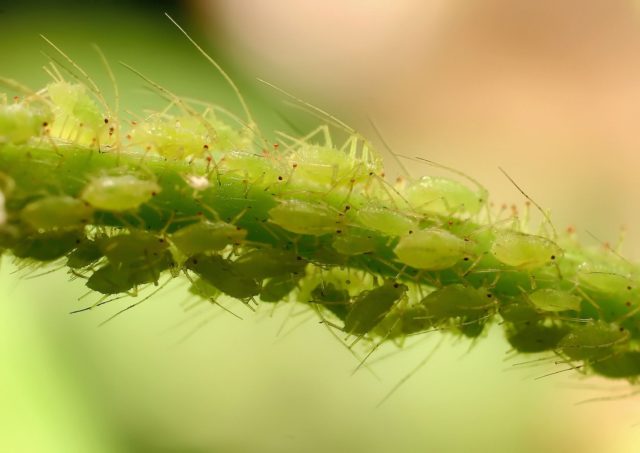
Aphids destroy peonies in no time
Conclusion
ITO peonies are the best version of herbaceous and arboreal varieties. They inherited only the best qualities from the parent plants. Today this hybrid is extremely popular, so planting material is easy to find. Both young and adult bushes are undemanding to care for. Everyone can grow them, regardless of experience in floriculture.






